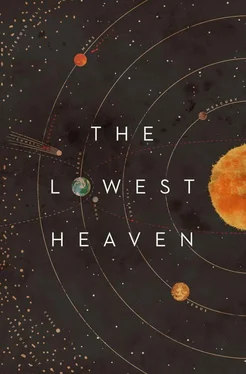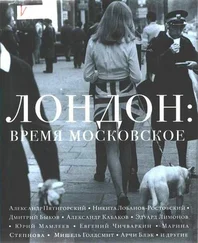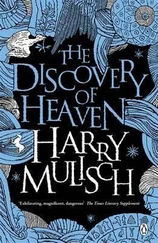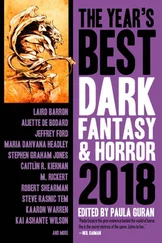“Hartmann was never the same after the murders,” she tells Russell, as they stand in the little cemetery, looking down at the tombstones. “At first they thought it had to be someone in town who did it. Because who would come all the way out here, just to kill someone? And then, even after everyone knew it was random, that it even might have been an accident, people just couldn’t stand it. ‘It’s not the kind of place I want to raise my kids anymore,’ I heard that a lot. And then as the crops began to fail◦– well, that was pretty much the death–knell for this place. Lots of people left, for Riccioli, or for the AT, or even for Earth. They keep telling us the decay won’t matter for centuries, but you can already see it changing things.”
She looks away, across the sorghum fields. “The house went into foreclosure a few weeks ago,” she says, meaning the Keck family farmhouse.
“What’ll happen to it, do you think?” Russell asks. They move away from the Keck graves, down a path worn through the grass by hundreds of sight–seekers.
Philips shrugs. “Probably get torn down, I imagine.” She’s silent for a moment. “They built a meat–packing factory up on the other side of town couple of years back; everyone’s giving ranching a try now. Everyone who’s left, I mean. They’ll tear down the house and put cattle on the fields for a few years. Until the decay can’t sustain that anymore either, I guess.”
They stop before another grave, this one belonging to Alvin Go, likely Deeds’ and Sinkman’s intended target. “Is it true they found two million dollars hidden around Go’s property after he died?” Russell asks.
Philips chuckles. “Not quite that much.” A true–crime book, For Love Alone , written by a notorious Venusian novelist and published seven years after the murders, was the first to propose that Alvin Go, who lived in a cabin at the end of a plane–tree–lined drive adjacent to the Keck property, was the miserly old man whom the murderers had set out planning to kill.
The two complete their amble through the little cemetery and walk out to the road, where Russell’s car is parked. “Can I give you a ride?” he asks.
“Thanks, but no,” she says. “I can walk from here.” They shake hands and Philips watches Russell get into the car and drive away. She waves at him as he pulls away, and can see his hand raised in response. Then, starting home, she walks toward the town and through it, leaving behind the big sky, the whisper of wind voices through the plane trees.

I’d be making charts of the things I saw there, the dark stars and explosions. There’d be worms the size of trains. I knew it, despairing with desire. There were mysteries in the Earth, and wonders.
_________
Detail from one of a set of 12 hand-tinted astronomical prints with explanatory cards. This image represents a section of the Earth and its atmosphere at the equator, drawn by John Emslie and published by James Reynolds. The oceans and continents are indicated, as are some islands and volcanoes. (1846)
THE KRAKATOAN
MARIA DAHVANA HEADLEY
The summer I was nine, my third mother took off, taking most of the house off with her. The night she left, I found my dad kneeling on the floor in front of the open refrigerator, and he looked at me for too long. He was supposed to be at work.
“What’s wrong?” I finally asked, though I didn’t want to know.
“No one’s in charge of you,” my dad told me. “No one’s in charge of anything. Haven’t you learned that yet?”
The cold fell out of the fridge like something solid, and I edged closer, hoping it’d land on me and cling. I was still vulnerable to the possibility that one of the mothers would work out.
“Alright then,” my dad said. He left the ice cream out on the counter, along with the contents of his pocket: three charred sticks, one of them short, two of them long, and a list of dead stars, as in celestial, his specialty.
Then he went to work, driving in the dark up the spiral road to his job at the observatory. It was one of the great mysteries of the heavens that my father had been married three times. He only looked up, and he was awake all night. Each of my mothers had complained about this, and eventually I picked up some things about which direction you should be looking, and which hours you should be keeping if you wanted a woman to stay with you. I practiced eye contact. I practiced sleeping.
I ate the entire carton of Neapolitan, beginning with the chocolate. I visited the top of my father’s closet, removed five Playboy magazines, and read them. I considered my three mothers, and compared them favorably to the naked women. I turned on the TV, and then turned it off. She’d taken the rabbit ears from the top, and now all we got was static. She’d taken the doorknob too. It was made of purple glass. When you put your eyeball up to it and looked in, it was like you’d arrived on Mars. I’d gotten a black eye that way, when she opened it accidentally into my face. Getting out of the house now required kicking and a coathanger pushed through the hole where the knob had been, and by the time I arrived outside, it was seven AM.
My dad was sleeping at the observatory. There were bunks. The astronomers were like vampires, slinking around under the closed dome until the sun went down, at which point they swarmed out to look at their sky. My dad had once referred to the solar system as My Solar System . He seemed to consider himself the sun, but he was not, and if he didn’t know that, I did.
We lived at the bottom of Mount Palomar, where the spiral road started. If you stayed on our road, you’d eventually make it to the observatory, a big white snowball of a building on the top of the mountain, and inside it, a gigantic telescope. The observatory, with its open and shut rotating roof, was like a convertible car and the astronomers were teenagers in love with black holes. Their sky made me miserable. I wanted humans. There weren’t many of them on the mountain, and my options were limited. I rarely went up. I went down, if I was going anywhere, and that day I went to Mr. Loury’s house.
Mr. Loury’s wife had, two years earlier, gone into the Great White Yonder. That was what my second mother, the hippie one who’d thought that astronomy and astrology were the same thing, had said about it. I don’t think she’d ever seen Jaws. I didn’t know what a Yonder was, and so in my mind, Mr. Loury’s young wife dove into the mouth of not just a great white shark, but a megalodon, every night for months. Then she got chewed up, and at the end she looked like canned spaghetti. My second mother hadn’t had much patience for a year of me retching over ravioli. I was pretty sure that was why she’d left.
Mr. Loury, with his attempt at a handlebar mustache and his short-sleeved button-downs, with his sadness, was a human fender-bender. I couldn’t stay away from his property. Normally I paced the perimeter, feeling his woe, but today, I had woe of my own and it entitled me to trespass.
He was sitting on his front steps drinking a beer when I arrived, and I sat down beside him, like this was something I did every day. My face was on-purpose sticky with ice cream, and it was beginning to acquire a furry stubble of dust. I was no longer nine years old, but a grown man in misery. My third mother was the one with whom I’d long been significantly and hopelessly in love.
“Hey, buddy,” Mr. Loury said. Not kid. This was progress. “Want a beer?”
Читать дальше













